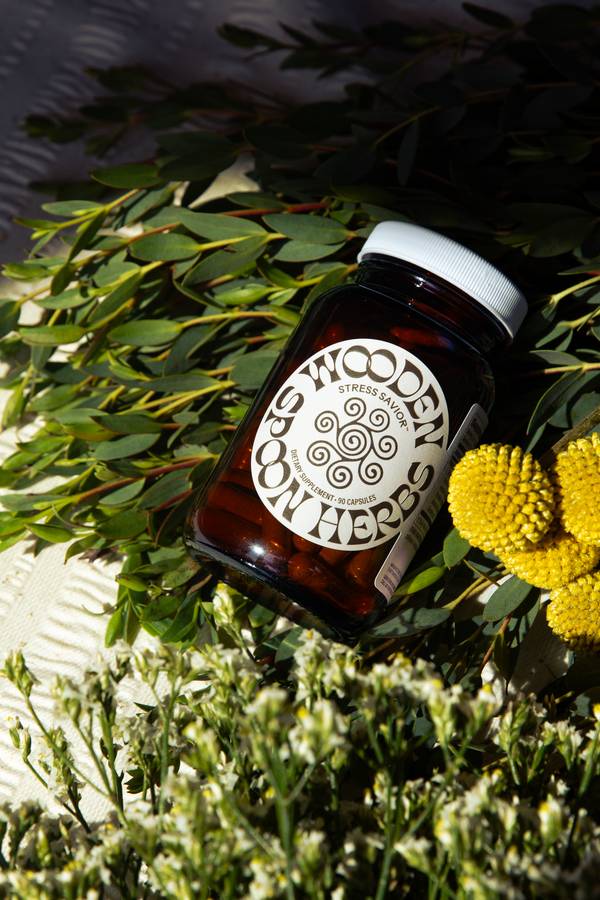Whether we like it or not, stress affects every function of the body, from boosting blood pressure to late-night teeth grinding – which is why it’s so important to learn how to manage it. It’s the origin of so many body-based feelings.

Stress can manifest in all sorts of ways: physical tension, frustrated outbursts, mood-swings, stomach issues, skin eruptions – the whole gamut. However your stress looks and feels, it’s rarely fun. It can be a tricky guessing game learning how to regulate it, or even its origin point.
Because our bodies—and lives—are all different, our stressors are all different, it can be helpful to use categories of herbs to figure out your best match. The main categories we turn to here are nervines, nerve tonics, and adaptogens. Some herbs, like holy basil (Ocimum sanctum), even fall into all 3 categories! Read on to learn more.
WHAT ARE NERVINES?
Nervines are simply herbs that affect our nervous system. Most often, the term refers to calming herbs, which make up the bulk of this category. Nervines can be helpful when taken over time, but are tailor-made for acute moments of stress when you need more immediate relief.
WHAT ARE NERVE TONICS?
Nerve tonics can be thought of as food for the nervous system. They’re highly nourishing to nervous system tissues and signaling molecules, and support the direct functions of said system. They are best taken regularly.
WHAT ARE ADAPTOGENS?
Adaptogens are herbs that help regulate our body’s overall response to stress. This class of herbs is small—only a dozen or so plants qualify as true adaptogens. These herbs act primarily on the neuroendocrine system, and thus can support all processes that stress affects in the glandular system—from hormone signaling to liver detoxification, and everyday in between. For this reason, adaptogens can easily be uniquely tailored to your specific body and how stress manifests for you. Feeling fatigued? Try rhodiola, an energizing adaptogen. Menstruation off-kilter? Try schisandra to support your liver. Overall, adaptogens help normalize our systems and are best taken overtime.

HERBS FOR STRESS
Oat tops: Oat tops are a nerve tonic (see above), deeply nourishing to the nervous system and adrenals, and can be especially supportive for burn-out. You can identify these juicy, nutritive little buds in the early summer when you squeeze the top of them and a milky substance comes out, This is when they really shine, right as the summer sun starts to rise highest in the sky! At this stage they’re called milky oats. Find oat tops in Tranquility Tonic and Rose-Colored Glasses.
Rose: Too stressed to relax? We turn to rose, a favorite nervine, when we need to calm down and cool off. This gorgeous gal can be especially supportive in moments of anger, frustration, or when your fuse is just feeling extra short. Rose is also incredibly soothing and supportive for grief, trauma, and times when your emotional heart needs some sweet tenderness. Find Rose in Rose-Colored Glasses and Rosehips (the fruit of the rose) in The Light Ray.
Holy Basil: Known as the “Queen of herbs”, Holy Basil, or Tulsi, is a gentle adaptogen and nervous system tonic. Supporting cerebral circulation, it helps clear the clouds of mental fog and improves cognitive function, as well as being a fantastic fit for calming the mood. Find Holy Basil in Tranquility Tonic.
Hawthorn: Hawthorn is a nervine berry that is specific to supporting the heart. It’s supportive for grief and heartbreak, brightening dark moods, soothing anxiety, and decreasing agitation. PLUS, it’s incredible for overall cardiovascular health as well! Find Hawthorn in Rose-Colored Glasses.
Reishi: In Traditional Chinese Medicine, Reishi is known as the mushroom of spiritual immortality. Its calming, adaptogenic qualities help the body regulate its response to stress. And as an added bonus, reishi is cooling and supportive to the liver, which can quickly become agitated during times of stress. In fact, in TCM theory, anger lives in the liver. Find Reishi in Mushroom Magic.
Schisandra: Schisandra is a delicious, nutritive adaptogenic berry that helps us establish harmony. This vibrant berry packs a flavorful punch to rejuvenate and nourish the nervous system while supporting the liver’s natural detoxification processes. Find Schisandra in Light Ray.
Ashwagandha: Ashwagandha is a soothing and supportive adaptogenic root, closely related to table tomatoes. It mildly uplifts our moods and helps us find rest so that we are better able to meet stressful circumstances with more comfort and ease. Find Ashwagandha in Tranquility Tonic.
Other ways to manage stress
- Spending time with a supportive community.
- Get outside! Even if it’s just a walk around your block.
- Exercise, however this resonates for you.
- Aim for 8 hours of sleep per night.
- Reduce sugar, alcohol, and caffeine.
However your stress manifests, assembling a team of supportive herbs and a healthy routine are crucial to ensure our bodies have the tools they need to both resist and recover from stress’s constant presence. We recommend picking an herb from the list above and working with it daily to see how it feels in your body! Herbal friends are the best friends. As always, please write us with any questions, or drop a comment below to discuss.



















